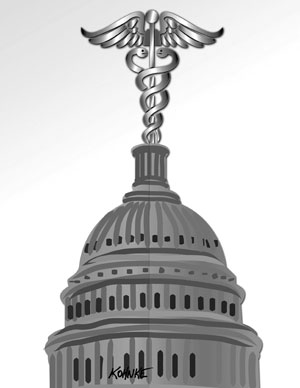Any time Congress creates a health care entitlement, it "crowds out" (i.e., displaces) private coverage, replacing private sector spending with increased taxpayer spending. The end result: Private spending and coverage contract while government entitlements, dependency, and spending grow.
Since the enactment of the Medicare Modernization Act of 2003, many conservatives in Congress and elsewhere have been impressed with Medicare Part D's performance in delivering high-quality drug coverage through intense private competition. Private sector drug delivery is indeed a positive feature of the 2003 law. Nonetheless, the Bush Administration and the congressional leadership created a universal entitlement to prescription drugs in the Medicare program. According to the 2004 Medicare Trustee Report (page 108), the "estimated present value of Part D expenditures through the infinite horizon (is) $21.9 trillion, of which $10.8 trillion would occur during the first 75 years."
In a new working paper published by the National Bureau of Economic Research, "Medicare Part D and the Financial Protection of the Elderly," economists Gary Engelhardt of Syracuse University and Jonathan Gruber of MIT show that the Medicare prescription drug entitlement substantially crowded out private drug coverage among seniors. They also show that the gains to seniors from a reduction in the risk of high out-of-pocket expenses were likely smaller than the economic costs of higher taxes to fund the program. According to economists, the economic cost of taxes occurs when individuals change their behavior or pass up productive activities in order to avoid the tax burden.
Engelhardt and Gruber compared prescription drug use and spending between individuals nearing 65 (specifically individuals age 60–64) to those just over 65 (specifically individuals age 65–70). Engelhardt and Gruber found that 72 percent of these seniors had drug coverage before the enactment of the Medicare drug entitlement. They credit the newly created Medicare drug program with raising the number of seniors with coverage by about 10 percent. The percent of seniors with government prescription drug coverage rose by 51 percent (from 15 percent to 66 percent) as a result of the law. Since there was an increase in overall coverage of only 10 percent, Engelhardt and Gruber estimate an 80 percent crowd-out rate from the Medicare drug entitlement.
They found similar results on drug spending. Expenditures on prescription drugs rose dramatically among the elderly—an overall increase of $400 per senior per year spent on drugs as a result of Part D. There was little change in the number of individuals filling a prescription, but the number of prescriptions filled per individual grew substantially after Part D's enactment. Public expenditures on prescription drugs rose by $1,900 per senior per year, while private expenditures fell by $1,500, so the spending crowd-out was also on the order of 80 percent.
The specific breakdown: spending by private insurers down 50 percent and out-of-pocket spending down 30 percent. Thus, Engelhardt and Gruber conclude "Although somewhat speculative, our estimates suggest that the welfare gains from the increased insurance provided by Part D were relatively small."
Worse, the small "welfare gains" were likely offset by economic inefficiencies resulting from tax increases to pay for the drug entitlement. Moreover, Engelhardt and Gruber did not account for the increasing tax burden on younger workers and their families.
None of these findings are surprising. When the Bush Administration and the congressional Republican leadership made the decision in 2003 to create a universal Medicare drug entitlement rather than focus direct assistance to low-income seniors, Heritage Vice President Stuart Butler argued that "there will be powerful incentives for current and future middle-income seniors to forgo private insurance protection at realistic prices in favor of government-sponsored drug coverage at subsidized prices. …The result: taxpayer costs will rise further." Butler and Heritage health policy director Robert Moffit argued at the time to target benefits to seniors who need them, instead of creating a universal drug entitlement for seniors. Amidst urgent warnings that unsustainable entitlement spending can destroy America's future, Engelhardt and Gruber's latest study validates Heritage's position during the 2003 Medicare drug debate.
Increasing entitlement spending imposes growing costs on taxpayers and results in a huge crowd-out effect, where taxpayers are forced to pick up the tab for health bills otherwise paid through the private sector. Under Obamacare, taxpayers are now faced with massive disruptions of private health coverage. Obamacare pours gasoline on the entitlement fires through enactment of the CLASS Program in addition to new insurance subsidies and a massive Medicaid expansion. If Congress allows these measures to take effect, additional millions of Americans will become dependent on government, and the crowd-out of the private market will accelerate, leaving taxpayers to cover the costs.
Co-authored by Brian Blase.
Sent from my iPhone

No comments:
Post a Comment